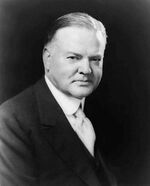
Herbert Hoover (10 August 1874 – 20 October 1964) was President of the United States from 4 March 1929 to 4 March 1933, succeeding Calvin Coolidge and preceding Franklin D. Roosevelt. His tenure was defined by the Great Depression, during which his "rugged individualism" policy led to widespread unemployment and poverty. He lost for re-election in a landslide in 1932.
Biography[]
Herbert Hoover was born in West Branch, Iowa in 1874, and he graduated with an AB in engineering from Stanford in 1895. He became a gifted administrator and self-made millionaire with an extensive knowledge of mining engineering, and he directed the Belgian relief operations from 1917 to 1919. Hoover became Commerce Secretary in Warren Harding's administration after being passed over for the Republican presidential nomination despite gaining influential support in 1920. His brief honeymoon after victory in 1929 over Al Smith, the Democratic nominee and the first serious Catholic candidate for the presidency, collapsed after the Wall Street crash. Since then his name was associated with the Great Depression, and his insistence that "prosperity was just around the corner", and all that was required was fiscal caution as the depression deepened, caused his reputation to plummet. He was beaten by Franklin D. Roosevelt in the 1932 election. After leaving office, he chaired several important commissions on the reorganization of the federal government and executive for Presidents Truman and Eisenhower, and was also consulted regularly by Presidents Kennedy and Johnson. He died in 1964.
